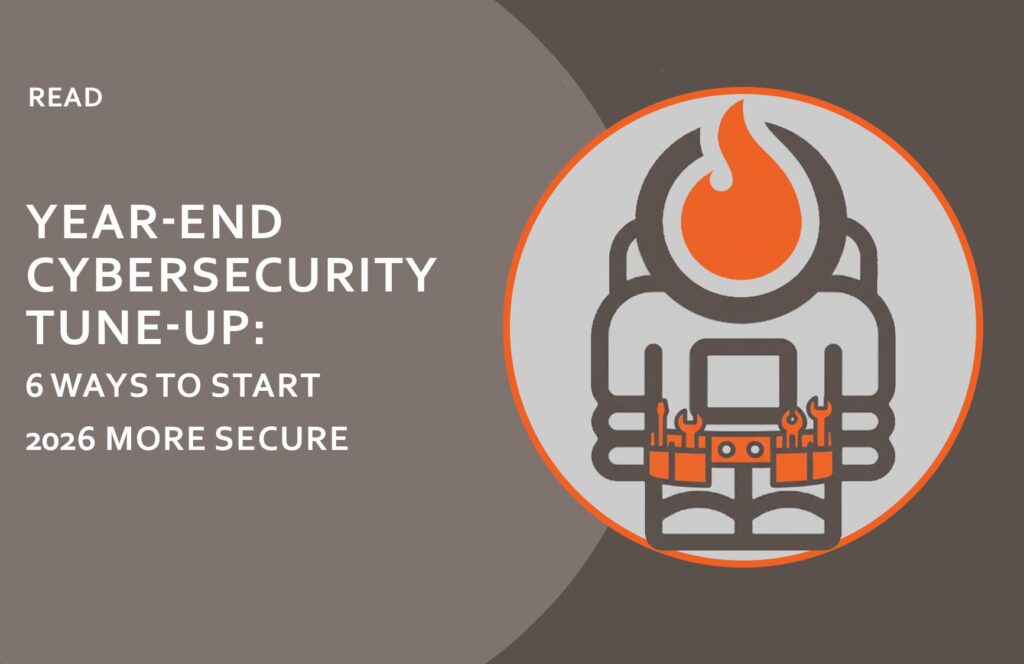READ: Year-End Cybersecurity Tune-Up: 6 Ways to Start 2026 More Secure

When people hear “cybersecurity,” they often think firewalls, passwords, and patching. But the truth is, most cyber incidents at smaller businesses don’t start with a technical failure.
Before you wrap up 2025, carve out a little time for a quick cybersecurity tune-up. These six practical actions focus on people, process, and planning: the areas that most often determine whether your business becomes a statistic or a success story.
-
How Often Should You Train Employees on Cybersecurity?
Your employees are still your first (and often last) line of defense.
If it’s been more than six months since your last cybersecurity awareness session, it’s time for a refresh. We believe that once or twice-a-year trainings are often too long to keep anyone’s attention and don’t move the needle when it comes to creating a ‘Culture of Security’. Instead, ongoing, consistent short trainings—monthly Awareness Trainings or Phishing Testing—are far more effective at keeping cybersecurity top of mind.
Also, encourage employees to use that training and speak up when something “feels off.” A culture where reporting is rewarded, not punished, is one of the best defenses a small business can build.
💡 Tip: Add quick security reminders to regular meetings and make cybersecurity awareness part of performance reviews.
For more on Creating a Culture of Security, READ: Why Cybersecurity Accountability for Small Businesses Starts with One Name
-
Why Should You Clean Up Digital Clutter?
Old accounts, shared logins, and forgotten cloud storage folders are goldmines for attackers.
Take inventory of your digital sprawl: everything from Dropbox folders to SaaS tools that “someone signed up for once.” Delete what you don’t need and document what you do.
Think of it like decluttering your shop floor or office: fewer things lying around means fewer opportunities for something to go wrong.
-
How Can You Prevent Financial and Payment Fraud?
Fraudsters love the holidays because everyone is more distracted, and finance departments are their favorite target.
Double-check that payment approvals, vendor change requests, and wire transfers have proper verification steps. Make sure employees know never to act on an urgent payment request from email or text without confirming through another channel.
💡 Tip: Add a mandatory “pause and verify” rule for any financial transaction over a set threshold—no exceptions, even for the boss.
For more on protecting against Financial Fraud, WATCH: Stacking Cash: Best Practices for Securing Financial Transactions
-
What Should an Incident Response Plan Include? Revisit Roles, Responsibilities, and Response Plans
If something goes wrong, who does what?
Review your incident response plan (or start one if you don’t have it). Make sure roles and contact info are current, especially for after-hours escalation. Plan a time to practice the plan with an Incident Response Tabletop. Update vendor and insurance contacts and print a hard copy in case systems go offline.
This isn’t an IT exercise—it’s about business continuity. When everyone knows their role, response times shrink and losses stay small.
-
How Does Cybersecurity Fit Into 2026 Business Planning?
Cybersecurity isn’t separate from business strategy; it’s part of it.
As you plan budgets, staffing, and growth initiatives for 2026, include cybersecurity in your discussions from the outset. Whether you’re expanding into new markets, adding vendors, or pursuing certifications like CMMC or SOC 2, your risk profile will change.
Integrating cybersecurity planning now prevents painful (and expensive) surprises later.
-
Should You Review Your IT Provider’s Cybersecurity?
Your IT Provider/Managed Service Provider (MSP) keeps your systems running, but that doesn’t always mean they’re keeping you secure.
Ask them:
- Which cybersecurity frameworks do you follow?
- How do you protect admin credentials?
For smaller manufacturers working toward CMMC, remember: if your MSP has access to your Controlled Unclassified Information (CUI), they’ll be part of your certification scope starting November 11th. Their readiness affects your readiness.
💡 Tip: Treat your MSP like any other vendor. Verify, don’t assume.
Your Year-End Mission: Simplify, Strengthen, and Secure
At OrbitalFire, we are focused on cybersecurity for smaller businesses. We help you protect your organization from cybercrime, audits, regulations, and yourself.
Need help understanding how to best head into 2026 with a cybersecurity strategy that’s aligned to your business mission? Join our Orbit.








